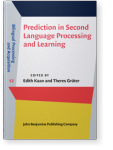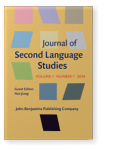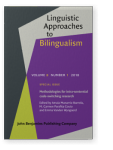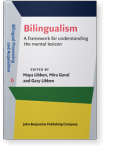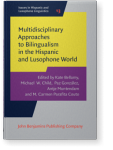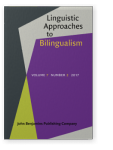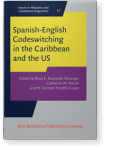Jorge R. Valdés Kroff
List of John Benjamins publications for which Jorge R. Valdés Kroff plays a role.
2021 Chapter 7. Code-switching: A processing burden, or a valuable resource for prediction? Prediction in Second Language Processing and Learning, Kaan, Edith and Theres Grüter (eds.), pp. 139–166 | Chapter
Monolinguals use various linguistic phenomena to guide prediction while comprehending. For bilinguals, the richer linguistic landscape provides additional resources. Code-switches (CS) are a particularly salient event, which could play a role in bilingual prediction. Despite the ubiquity and… read more
2018 Grammatical gender processing in L2 speakers of Spanish: The role of cognate status and gender transparency Journal of Second Language Studies 1:1, pp. 5–30 | Article
Recent findings indicate that native speakers (L1) use grammatical gender marking on articles to facilitate the processing of upcoming nouns (e.g., Lew-Williams & Fernald, 2007; Dussias, Valdés Kroff, Guzzardo Tamargo, & Gerfen, 2013). Conversely, adult second language (L2) learners for whom… read more
2018 Experimental contributions of eye-tracking to the understanding of comprehension processes while hearing and reading code-switches Methodologies for intra-sentential code-switching research, Munarriz-Ibarrola, Amaia, M. Carmen Parafita Couto and Emma Vanden Wyngaerd (eds.), pp. 98–133 | Article
Researchers who study code-switching using lab-based approaches face a series of methodological challenges; these include, but are not limited to, using adequate techniques and tasks that allow for processing that reflects real-language usage and selecting stimuli that reflect the participants’… read more
2017 When cognate status produces no benefits: Investigating cognate effects during the processing of code-switched sentences Bilingualism: A framework for understanding the mental lexicon, Libben, Maya, Mira Goral and Gary Libben (eds.), pp. 143–180 | Chapter
Experimental studies examining the production and comprehension of language switches have provided evidence for a subtle but significant “switch cost:” switched words take longer to process than non-switched words (e.g., Altarriba, Kroll, Sholl, & Rayner, 1996; Gollan & Ferreira, 2009; Gollan,… read more
2017 Chapter 9. Experimentally inducing Spanish-English code-switching: A new conversation paradigm Multidisciplinary Approaches to Bilingualism in the Hispanic and Lusophone World, Bellamy, Kate, Michael W. Child, Paz González, Antje Muntendam and M. Carmen Parafita Couto (eds.), pp. 211–233 | Chapter
U.S. Spanish-English bilinguals intentionally engage in code-switching. Its experimental study is challenging, due to the lack of a meaningful context or turn-taking between speakers. We report on the use of a referential communication task to experimentally elicit code-switching. Data from 10… read more
2017 Experience with code-switching modulates the use of grammatical gender during sentence processing Linguistic Approaches to Bilingualism 7:2, pp. 163–198 | Article
Using code-switching as a tool to illustrate how language experience modulates comprehension, the visual world paradigm was employed to examine the extent to which gender-marked Spanish determiners facilitate upcoming target nouns in a group of Spanish-English bilingual code-switchers. The first… read more
2016 Mixed NPs in Spanish-English bilingual speech: Using a corpus-based approach to inform models of sentence processing Spanish-English Codeswitching in the Caribbean and the US, Guzzardo Tamargo, Rosa E., Catherine M. Mazak and M. Carmen Parafita Couto (eds.), pp. 281–300 | Article
Bilinguals speaking with other bilinguals engage in codeswitching (CS). CS is not a priori predictable, yet bilinguals suffer no appreciable costs to communication. One hypothesis explaining this ease is an exposure-driven account whereby speakers converge upon conventional production patterns,… read more
